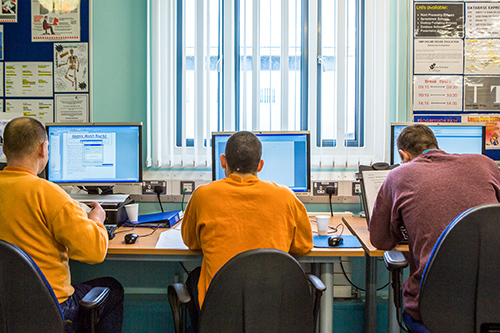Better advice and information could improve confidence in hiring people convicted of sexual offences
Over half of employers would feel more confident hiring people with sexual convictions if they had access to management advice, or if they believed that the applicant wouldn’t reoffend, a joint report by the Prison Reform Trust and Unlock reveals.
Almost half of employers surveyed would be reassured by knowing the person would be under strict probation supervision, and over a third if they believed that other workers would accept them.
Thinking Differently, written by Dr Mia Harris, Dr Rachel Tynan and Dr Kimmett Edgar, explores employers’ attitudes towards hiring people convicted of sexual offences. Its findings are based on a survey of employers and interviews with prison resettlement officers, employers, charities and other professionals.

Sexual offences cover a wide range of very different behaviours, from some of the most serious crime on the statute book to, for example, 17-year-olds sending sexual images of themselves to their partners. In the year ending March 2020, police recorded 154,113 sexual offences. However, given the lack of reporting, this figure is likely to underestimate the true extent of sexual offending.
Reoffending rates for people convicted of sex offences are low compared to other offence types. On average, between 10 and 15% of people convicted of sex offences are charged for another sexual offence within five years.
Research evidence suggests that having a stable job can help reduce reoffending, including by those convicted of sexual offences, by providing structure, a sense of belonging, personal fulfilment, and a perception of something to lose. However, employers tend to discriminate against people with convictions in general, and people convicted of sexual offences are the most stigmatised within that group.
There are some jobs, for instance those involving contact with children or vulnerable adults, where a sexual conviction may be a legitimate reason for not employing an individual due to safeguarding concerns.
However, there are many jobs for which a sexual conviction should not be a bar to employment and in which any risk presented by the individual could be safely managed. But too often discriminatory employment practices and attitudes prevent people with sexual convictions from entering the workplace. Understanding employers’ views about hiring people convicted of sexual offences is therefore an important part of any strategy to increase opportunities for employment, in pursuit of reintegration and safer communities.
As well as exploring the attitudes of employers to hiring people with sexual convictions, the report sought to assess whether better-informed employers might be more open to hiring people from this group. In order to do so, two versions of the survey were used. The long version of the survey provided information about sexual offending, supervision and support in the community and reoffending rates.
Employers who were given additional information about sexual offending were found to be three times less likely to list reoffending as a reason not to employ people with sexual convictions than those employers who were not sent the longer survey. These findings must be treated with caution, because employers taking the long version of the survey were more likely to report from the outset that they were open to hiring people with convictions, and actively promoting the recruitment of people with criminal records.
Among the report’s recommendations are for employers to be provided with factual information about all offending, but particularly sexual and violent offending. This should include detail on risk factors and assessment and supervision and safeguards.
Commenting in the Foreword of the report, Dr Lynn Saunders OBE, governor at HMP Whatton and Chair and co-founder of the Safer Living Foundation, a charity established to prevent sexual (re)offending, said:
“People with sexual convictions find it difficult to obtain work even though they are often well motivated, skilled, and have a good work ethic—desirable characteristics for any employer. Although the impact of a sexual offence on an individual victim should not be underestimated, neither should the importance of reducing the likelihood of the creation of future victims. Providing a person with the opportunity to obtain stable employment has a significant impact on the prevention of sexual crime. Given advice about how they can be safely managed in the workplace, employers can assist their successful rehabilitation.”
Peter Dawson, Director of the Prison Reform Trust, said:
“This detailed and thorough report tackles a subject that it would be all too easy to ignore. But stigma thrives on ignorance, and ultimately harms public safety. Balanced, accurate information about the huge range of behaviour that is categorised as sexual offending, and about the supervision of people convicted of those crimes, can build employers’ confidence. Just as people need safe places to live when they leave prison, so they also need a way to earn a living – our communities will be safer when we remove the barriers that stop that from happening.”
Christopher Stacey, Co-director of Unlock, said:
“People with convictions face stigma and obstacles many years after their sentence is complete. For people convicted of sexual offences that is amplified and we regularly hear from skilled and motivated people who cannot find a job as a result. Employment enables people to give back – to their family, community and by contributing to the economy – and it makes society safer too. This report shows that employers can, with the right information and support, start to see people with convictions for sexual offences as potential employees.”